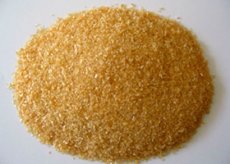The properties of gelatin are comparable with drugs
Last reviewed: 15.08.2021

All iLive content is medically reviewed or fact checked to ensure as much factual accuracy as possible.
We have strict sourcing guidelines and only link to reputable media sites, academic research institutions and, whenever possible, medically peer reviewed studies. Note that the numbers in parentheses ([1], [2], etc.) are clickable links to these studies.
If you feel that any of our content is inaccurate, out-of-date, or otherwise questionable, please select it and press Ctrl + Enter.

It is unlikely that any of the adherents of a healthy lifestyle thought about the fact that gelatin may become one of the first products of a healthy diet. Scientists are sure: gelatin is not just a basis for desserts, but a product that can replace many drugs. Few know that gelatin is a protein. It is obtained when processing animal by-products, extracting pure collagen from them. Gelatin consists of a number of amino acids - specific components that potentiate the processes of protein synthesis. They are spoken of as irreplaceable amino acids that are not produced in our body. In addition to the amino acids glycine, valine and proline, the molecules of lysine, arginine and alanine can be present in the gelatin. Where is gelatin usually used? This is an ordinary ingredient, present in jelly sweets, cakes, jellies, as well as in some medicines and even in cosmetics. What are the useful properties of gelatin?
- The protein, contained in gelatin, provides the skin with health and youth. Therefore, using this product, you can significantly improve the appearance of the face and body.
- Gelatin does not just contain protein in its composition. It contains it in huge amounts, and it does not contain fat and cholesterol: for example, in 100 g of gelatin it can contain about 87-88% of pure protein.
- With regular use of gelatin, you can restore mucous tissues in the stomach and intestines.
- Collagen, which is part of gelatin, can alleviate joint pain in arthrosis and arthritis.
- Introduction to the diet of gelatin helps to stabilize the level of glucose in the blood in patients with diabetes mellitus type II.
- In gelatin there is lysine, which strengthens the bone system. More precisely, under the influence of lysine, bones are better absorbed by calcium. This property is especially important for elderly or women who entered the menopause period, who have a high risk of osteoporosis.
- Gelatin can stabilize sleep, since it contains glycine - an amino acid with a calming effect.
- Gelatin will help in the fight against excess weight, as it eliminates the feeling of hunger.
However, using gelatin as a means to get rid of extra pounds, you do not need to add sugar, salt and fats to it. If gelatin is intended to be used in place of a medicine, then only a high-quality product of proven brands should be selected. Cheap analogs can contain harmful impurities, which not only will not help, but also harm your health. Scientists are reassuring: a food component such as gelatin has practically no side effects. However, there are contraindications to its use. It is a tendency to allergies, constipation, water-salt metabolism disorders, gout, thrombophlebitis, urolithiasis. If there are no contraindications, then gelatin can be safely added, as in the first dishes, and in gravies, pates, drinks. And in many pharmacies you can already buy gelatin in the form of capsules for oral administration.
